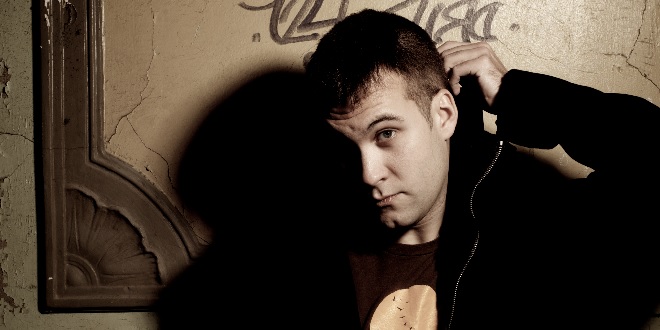Chiliean wonderkid Alejandro Arroyo speaks to one of Spain’s leading underground artists and sound engineers, AFFKT.

We know that you studied Musical Theory and Piano. What can you tell us about your experience in the Valencia’s Conservatorium? Did they saw you as a mad guy because you wanted to make electronic music or there is a much warmth ambience when it comes to exploration? On the other hand, Which course or career would you recommend to any Musical Producer dedicated to this music?
Was great to study classical music, I guess defined how I produce music nowadays. When I was studying they were just focus in Classical music but not sure how is it now. I started producing music after leaving the musical school
so…
I think everyone need a different things to learn depending on the music he wants to do, sometimes I listen amazing music from producers that they have any idea of music theory or whatever, but this in fact in giving them a fresh point
of view. Once you know the music you want to do, you can go deeper in sound technics, music theory, sound experimentation…
Tell us more about the Spanish scene. How are they reacting to the more experimental stuff?
There it isn’t a big underground music scene in Spain yet compared with countries like Germany, where in each little town you have a club with a proper artists schedule. The Indie crowd has a big amount of people, but the truth is that the more underground and experimental music isn’t getting too much support across the country.
Most people would rather go to a festival or club to listen to something they already know, rather than explore and go to listen something new or that will surprise them. That’s something i can’t understand yet.
We know that running a label nowadays is quite a challenge, and your SINCOPAT imprint takes a place in the scene for it’s very mature and modern sound. Where does the name came from? And how is to run a label in 2014?
Yes, managing a label is hard work, even when my partner Alberto makes the hardest part; there is so much work beside. Catalanish word Sincopat mean ‘Ragtime’ a musical concept of the rhythm but also a music style of the early last century that we could say is the grandmother of the Jazz/Soul/Funk, so is kind of the seed of the Techno/House/…
After 4 years now is something I really enjoy even when it takes me as I say so much time, because I try to put on it so much love as possible, managing a label for me should be something artistically as well and that how I like to do it.
How did you start getting involved with the global underground circuit? Which moment do you think that started the snowball effect?
There’s some higlights I am really proud of. Being able to produce a wide range of musical styles and being competent is on of them. But I guess I am proud of all the projects I have been doing along my life, some of them still open some already close.
Also my new studio and Sincopat/Pobla Offices was a huge effort for me, we have build a 200 meter place with 2 amazing studios and a great place to work with all my team.
We want to know more about your other musical projects. Had read that with “Malsum” you are developing proper drum n’ bass stuff and with “Renace” you’re going straight to the more darkside of techno. You do it just for fun or are you planning something serious with this ramifications?
By the time I use to produce Drum & Bass the scene was not so big, we were one of the Spanish projects but the style was not so global like now.
I think when I jump to produce from Techno to House musc, from House to electronica, I wide range of styles I would say with the name of AFFKT and after releasing one of my first tracks call ‘Points’ along Danny Fiddo. After that the steps forward went more slowly but in a way every step had been more solid, I guess everything came so fast when we release ‘Points’. After this release I just have been trying the music I feel in every time, sometimes more dark, sometimes more lightly but trying to be as honest with myself as possible…and for me that’s the only way.
Malsum and Renace are projects that are currently on Stand By. But had to say that Malsum is still active thanks to my mate Ibrah that’s part of the band. With the time AFFKT has absorb other sonorities. I feel the project as something with no stylish limits and that will be developed in the future.
It’s true that i got other new projects like “You & Oui” with the French producer. We’re currently working developing a live show. I try to feel every project with a lot of fun because, otherwise, they might lost their light and freshness.
Above being music producer and label owner, you also work as a music engineer. In which projects had you been involved recently? Do you any email contact or for now you’re just working with fellow artists? To end with, define in 3 concepts the ideal mixdown for an accurate mastering.
Pobla is a enterprise that has already 3 years now. We focus on doing mix and mastering services for some of the most important artists and labels nowadays, and obviously for anyone that it’s interested on going deeper in his sound. The team is conformed by Camilo e e Iñaki and the truth is that im very happy seeing how all has developed through the years.
We had worked on a lot of pieces but i can easily highlight some of the most inspiring works such as the “Hot Since 82” album for “Moda Black”, “Digitaria’s” album for “Hot Creations” and the last one that was “Dosem’s” album for “Suara”
The most important 3 concepts for me regarding the mixdown are balance, depth and dynamics.
How do you see the general panorama in terms of innovation when it comes to house and techno? What catches your attention when you’re hearing new stuff from other artists?
Personally think that brilliant music is done these days. The stylish boundaries are everytime more diffuse allowing artists to innovate. What really catches my attention is when they surprise me. I really enjoyed the feel when you listen to electronic music and you can’t figure out how the artist get that sound.
How has it been and where can we find you playing soon?
Is being an amazing summer, this year I have a residency in Suara ́s Boom nights along my good friend and Suara ́s master mind Coyu, like a part of the Suara family is being a big challenge for us but we are really happy how the party is going. I will playing as well Beirut, Qatar, Switzerland, Montenegro, USA, India, … And of course Spain!

1. Sabemos que estudiaste Teoría Musical y Piano. ¿Qué nos puedes contar sobre tu experiencia en el conservatorio de Valencia? ¿Te veían como bicho raro por querer hacer música electrónica o existe un clima más abierto a la exploración? Por otro lado, ¿Qué curso o carrera le recomendarías a todo Productor Musical de nuestro ámbito?
Fue genial estudiar música clásica, creo que definió la forma en que produzco música hoy por hoy. Cuando estaba cursando, el foco de la escuela era la música clásica pero no sé cómo la dirigen en el presente. Empecé a producir después de terminar el conservatorio.
Personalmente creo que todos necesitamos diferentes cosas para aprender dependiendo de la música que queremos hacer, a veces escucho musica excelente de procutores que no tienen ninguna idea de teoría musical o algo similar. Una vez que decides qué música quieres hacer, puedes entrar en profundidad en los aspectos técnicos, la teoría musical o la experimentación sónica.
2. ¿Cómo definirías tu relación con la creatividad? ¿De qué forma conectas con ella?
Para mí la creatividad es una necesidad. Ahora luego de muchos año produciendo música, encuentro fácil poder crear con libertad. Antes no fue fácil. Creo que esto se logra con experiencia.
3. Cuéntanos un poco sobre el público español. ¿Cómo reaccionan frente a la música más experimental?
Yo creo que en España sigue sin haber una gran escena de música underground en comparación a otros países como Alemania, en el que en cada pequeño pueblo tienes un club con una programación de artistas más o menos
competente.
No creo que se fijen demasiado en la música, sino más bien en otras cosas. Si es cierto que un sector de público más indie cercano a la Electrónica pueda ser algo mas amplio en número, pero lo cierto es que la música más underground y experimental es minoritaria.
Y hablando de un público masivo parece que la gente esté más predispuesta a ir a un club o festival de música a escuchar algo que ya conoce, en vez de ir a escuchar algo nuevo que pueda sorprenderle, y eso es algo que no acabo de
entender.
4. Sabemos que hoy por hoy llevar un sello discográfico es un sacrificio notable, y tu Label SINCOPAT se distingue dentro del circuito por otorgar sonidos maduros y modernos. ¿De dónde nace el nombre? ¿ Cómo es mantener un label en el 2014?
Sí, manejar un sello es un trabajo duro, aún cuando mi partner Alberto realiza la parte más compleja, hay mucho trabajo detrás. La palabra Sincopat es Catalana y significa “tiempo sincopado” o “ragtime” un concepto musical del ritmo pero también un estilo musical de los inicios del siglo pasado que podríamos decir sería como la abuela del Jazz/Soul/Funk así que es como la semilla del Techno/House…
Luego de 4 años llevando el sello es algo que realmente disfruto aún cuando demanda mucho tiempo porque trato de poner todo el amor posible. Llevar el label para mí es algo que debe ser artístico. Así me gusta que sea.
5. ¿Cuáles crees que han sido tus mayores logros hasta ahora?
Hay algunos “highlights” de los cuales estoy muy orgulloso. Ser capaz de producir un amplio rango de estilos musicales y hacer de buena forma es uno de ellos. Pero creo que estoy orgulloso de todos los proyectos que hecho a lo largo de mi vida, algunos de ellos permanecen abiertos, otros no.
También mi nuevo estudio y las oficinas Sincopat/Pobla fueron un tremendo esfuerzo. Hemos construido lugar de 200metros cuadrados con 2 estudios asombrosos además de un gran lugar para trabajar con todo el equipo.
6. ¿Cómo comienzas a vincularte con el circuito underground global? ¿En qué momento crees que comenzó el efecto bola de nieve que te posiciona donde estás ahora?
Cuando producía Drum&Bass la escena no era tan grande, éramos uno de los pocos proyectos españoles pero el estilo no era tan global como ahora.
Creo que cuando decidí saltar del techno al house, del house a la electrónica, cubrí un gran panorama de estilos y diría que con el nombre AFFKT y luego de lanzar uno de mis primeros tracks llamado “Points” con Danny Fiddo empecé a dar pasos cada vez más sólidos.
7. Queremos conocer sobre tus otros proyectos musicales. Hemos leído que con “Malsum” te avocas al sonido drum n’ bass y con “Renace” vas hacia el techno más oscuro. Lo haces solo por diversión o tienes planes serios con estas ramas?
Malsum y Renace son proyectos que tengo aparcados ahora mismo, pero he de decir que Malsum sigue en activo gracias a mi compañero en la banda Ibrah. Con el tiempo AFFKT a ido absorbiendo otras sonoridades que quizá inicialmente no
contemplaba, pero lo siento como un proyecto sin limites estilísticos y esto es algo que se ira reforzando en el futuro
Si es cierto que tengo otros proyectos nuevos como You & Oui junto al productor francés, en el que estamos también trabajando en un directo conjunto.
Todos los proyectos intento tomármelos por diversión porque creo que sino corren el peligro de perder la frescura.
8. Además de tu carrera como productor musical y dueño de un label, trabajas como ingeniero en sonido. ¿En qué proyectos has contribuido últimamente? ¿Tienes algún mail de contacto o por ahora sólo trabajas con artistas cercanos? Por último, define en 3 conceptos el mixdown ideal para un mastering exitoso.
Pobla es una empresa que cree ahora hace 3 años, nos dedicamos hacer mezclas y mastering para algunos de los artistas y sellos mas importantes a día de hoy y por supuesto también para todo aquel que este interesado en dar un paso mas allá en su sonido. El equipo esta formado también por Camilo e Iñaki y la verdad es que estoy muy contento en como se esta desarrollando el proyecto.
Ten un gran volumen de trabajo pero puedo resaltar algunos proyectos muy inspiradores como fueron el abum de Hot Since 82 para Moda Black, el de Digitaria para Hot Creations o el ultimo que hemos hecho para Dosem en Suara.
Los 3 conceptos mas importantes para mi en un buen mixdown son equilibrio, profundidad y dinámica,
9. ¿Cómo ves el estado general en cuanto a innovación en la música house y techno? ¿Qué llama tu atención a la hora de escuchar música de otros artistas?
Personalmente creo que se esta hacienda mejor música que nunca, las barreras estilísticas están cada vez mas difusas y creo que eso algo muy bueno. Lo que más llama mi atención es que me sorprendan y que no me dejen indiferente,
hay mucha música ahí fuera que parece copias exactas de otros temas. Me gusta mucho escuchar música y no tener muy claro como se ha podido conseguir ese sonido concreto.
10. ¿Cómo ha sido este verano para ti?¿Dónde te podemos encontrar tocando próximamente? What about this summer? How has it been and where can we find you playing soon?
Ha sido un verano increíble. Este año tuve una residencia en las noches de “Suara” en Boom, Ibiza junto a mi amigo y mente maestra, Coyu. Ser parte de la familia Suara es un gran desafío pero estamos muy contentos con las fiestas que hemos logrado.Voy a estar tocando en Beirut, Qatar, Suiza, Montenegro, Estados Unidos, India y obviamente, en España!




